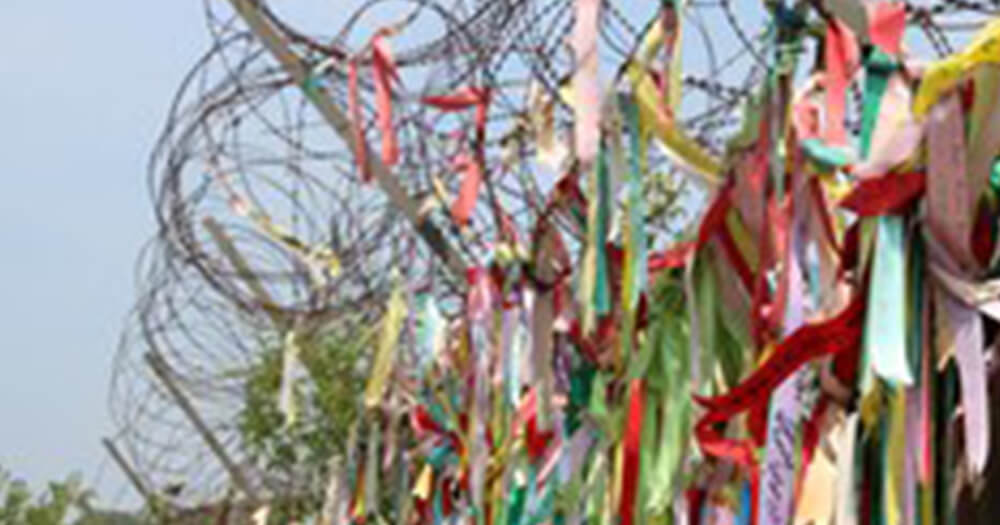
June 2020
This Message is issued by the World Council of Churches with the endorsement of the churches, councils of churches and church leaders listed below. Available also in Korean.
Seventy years ago, a conflict began that was to cost the lives of approximately three million people – the majority of them civilians, result in the destruction of virtually all of the major cities on the Korean Peninsula, separate many families, and leave a lasting legacy of bitterness, fear and division among people who share the same language, traditional culture and ancient history.
The foundations for this catastrophic conflict were laid by the post-World War II division of the Korean Peninsula by the United States of America and the Soviet Union, which – in a bitterly cruel turn of events – followed almost immediately the liberation of Korean people from 36 years of Japanese imperial domination. The division into North and South became entrenched during the ensuing Cold War, which provided the context and impulses for the war that began on 25 June 1950, and of which the Korean people were overwhelmingly the victims.
After three years of appallingly destructive conflict, an Armistice Agreement was signed on 27 July 1953, establishing a ceasefire and creating a Demilitarized Zone separating North and South Korea. However, no peace treaty was ever concluded, and so the parties remain, technically, at war up to the present date.
On this sombre 70th anniversary occasion, we, as churches and councils of churches from countries that played a role in the division and conflict on the Korean Peninsula, join in calling for:
- An immediate formal declaration of the end of the Korean War; and
- Swift steps towards the adoption of a peace treaty to replace the 1953 Armistice Agreement, as a starting point for further progress towards the realization of a permanent peace regime on the Korean Peninsula.
Seven decades after this war began, it is time to acknowledge that it ended long ago. New challenges to peace and stability in the region have arisen in the meantime, but we do not believe that the resolution of those challenges will be facilitated by keeping that 70-year-old conflict open. On the contrary, we believe that the conditions for pragmatic dialogue and negotiation on current realities on the Peninsula could be greatly enhanced by recognizing the end of the war.
We expect that this long overdue recognition of historical reality, and a peace treaty to document it, would be a pivotal contribution to reducing tensions and hostility in the region, and to restoring a conducive environment for resumption of the stalled process of the Panmunjom and Singapore summit outcomes. To further restore that environment, we also call for:
- Suspension and cancellation of any further military exercises in the region;
- Resumption of dialogue between the Republic of Korea and the DPRK, and between the USA and the DPRK, with the encouragement and support of other states who were involved in the Korean War; and
- The normalization of diplomatic relations between the DPRK and the USA.
We appeal for the fulfilment of the letter and spirit of all the agreements that had given so much hope of progress towards peace on the Korean Peninsula – in particular the Panmunjom Declaration of April 2018, the Pyongyang Joint Declaration of September 2018, and the Singapore Joint Statement of June 2018. We pray for the realization of the vision of the Korean Peninsula as a nuclear-free zone, and a world completely free from the threat of nuclear weapons.
The history of the Korean War has taught us that the reunification of Korea cannot be pursued by armed force and coercive means, given the tragic consequences of that conflict. It can only be achieved by peaceful means, through dialogue and cooperation.
We pray that through dialogue and cooperation the long-divided Korean people may heal the wounds of division and conflict, find again their common identity and shared future, and provide leadership and inspiration for peace in the north-east Asian region and throughout the world.
Endorsements from countries that participated in the Korean War
South Korea:
National Council of Churches in Korea
Presbyterian Church of Korea
Korean Methodist Church
Presbyterian Church in the Republic of Korea
Anglican Church of Korea
United States of America:
National Council of the Churches of Christ in the USA
United Methodist Church (USA)
Presbyterian Church (USA)
United Church of Christ (USA)
Christian Church (Disciples of Christ) in the United States and Canada
African Methodist Episcopal Church
Mennonite Central Committee U.S.
The Evangelical Lutheran Church in America
Australia:
National Council of Churches in Australia
Uniting Church in Australia
The Religious Society of Friends (Quakers) in Australia
United Kingdom:
Churches Together in Britain and Ireland
United Reformed Church
The Rt Revd Stephen Cottrell, Bishop of Chelmsford
Thailand:
Church of Christ in Thailand
Canada:
United Church of Canada
Anglican Church of Canada
Canadian Association of Baptist Freedoms
Canadian Baptists of Ontario and Quebec
Canadian Yearly Meeting of the Religious Society of Friends
Christian Reformed Church in North America
Ethiopian Orthodox Tewahedo Church in Canada
Evangelical Lutheran Church in Canada
Presbyterian Church in Canada
Salvation Army Canada and Bermuda Territory
Ukrainian Catholic Church in Canada
Mennonite Central Committee Canada
Philippines:
National Council of Churches in the Philippines
New Zealand:
Presbyterian Church of Aotearoa New Zealand
Ethiopia:
Ethiopian Orthodox Tewahedo Church
Ethiopian Evangelical Church Mekane Yesus
France:
United Protestant Church of France (l’Eglise protestante unie de France)
South Africa:
South African Council of Churches
The Netherlands:
Kees Nieuwerth, Vice-President, Council of Churches in the Netherlands
Other endorsements
International:
Ecumenical Patriarchate
World Communion of Reformed Churches
World Methodist Council
World Alliance of YMCAs
Asia and Pacific Alliance of YMCAs
Germany:
Protestant Church in Hesse and Nassau (Evangelische Kirche in Hessen und Nassau)
Bishop Petra Bosse-Huber, Protestant Church in Germany (Evangelische Kirche in Deutschland)
Japan:
National Christian Council in Japan
The Korean Christian Church in Japan
Norway
Church of Norway
Russia
Russian Orthodox Church (Moscow Patriarchate)

